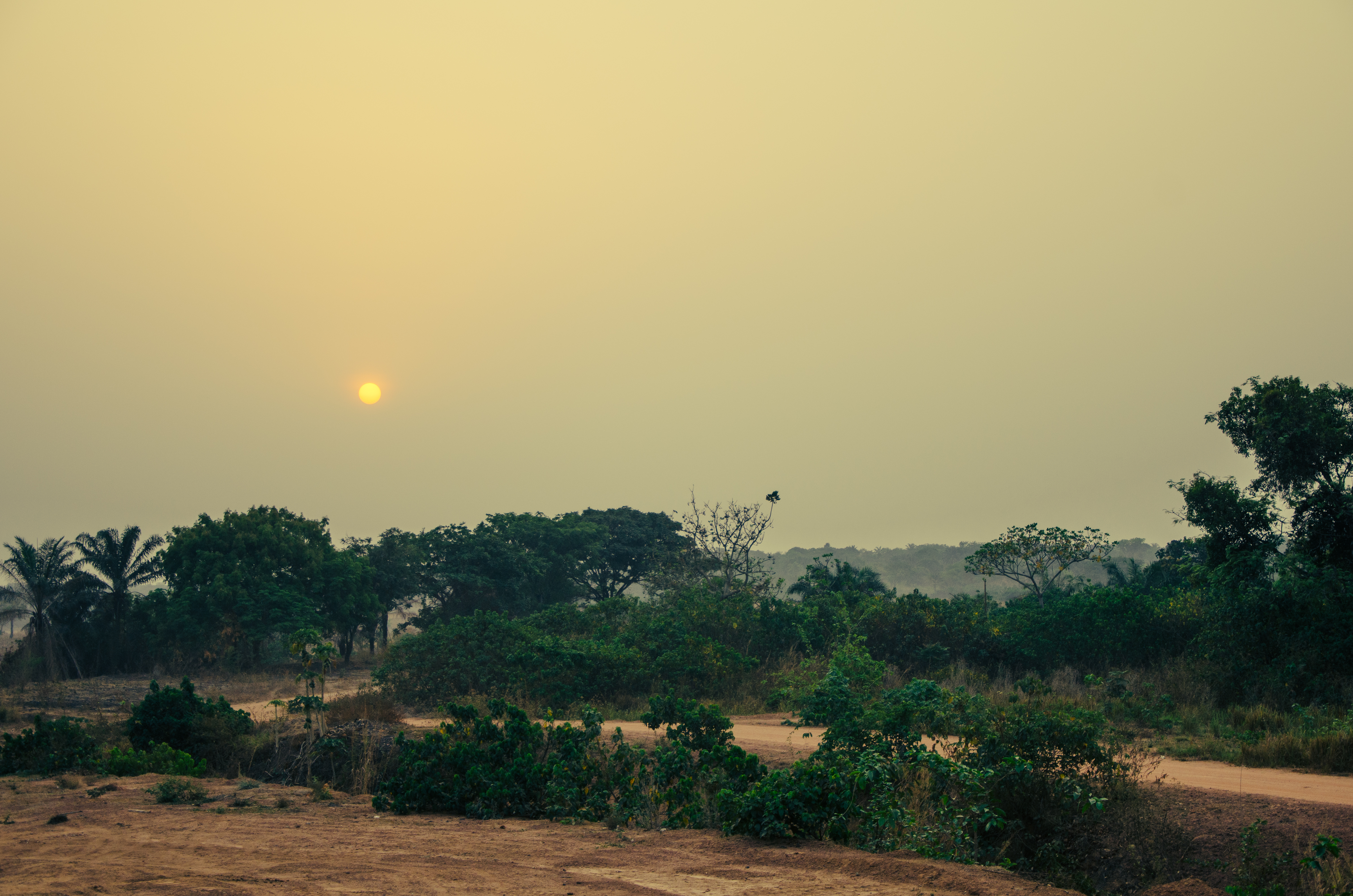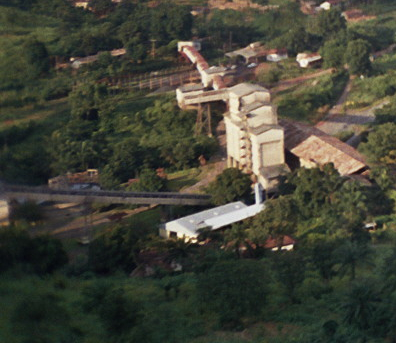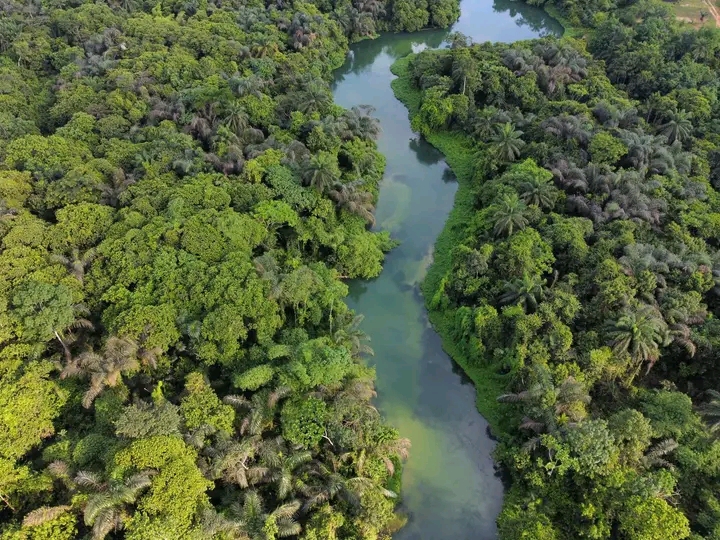|
Igboland
Igboland ( Standard ), also known as Southeastern Nigeria (but extends into South-Southern Nigeria), is the indigenous homeland of the Igbo people. It is a cultural and common linguistic region in southern Nigeria. Geographically, it is divided by the lower Niger River into two sections: an eastern (the larger of the two) and a western one. Its population is characterised by the diverse Igbo culture and the speakers of equally diverse Igbo languages. Politically, Igboland is divided into several southern Nigerian states; culturally, it has included several subgroupings, including the Anioma, the Ngwa, the Aro, the Ezza, the Ibeku, the Ohuhu, the Oboro, the Ikwerre, the Ogba, the Omuma, the Ohafia, the Oyigbo, the Mbaise, the Isu and the Ekpeye. Territorial boundaries Igboland is surrounded on all sides by large rivers, and other southern and central Nigeria indigenous tribes, namely Igala, Tiv, Yako, Idoma and Ibibio. In the words of William B. Baikie, "Igbo s ... [...More Info...] [...Related Items...] OR: [Wikipedia] [Google] [Baidu] |
Odinani
Ọdinani (), also ''Omenala'', ''Omenana'', ''Odinana'' or ''Ọmenani'', are the traditional cultural beliefs and practices of the Igbo people of south east Nigeria.Afulezy, Uj"On Odinani, the Igbo Religion", ''Niger Delta Congress'', Nigeria, April 03, 2010 These terms, as used here in the Igbo language, are synonymous with the traditional Igbo " religious system" which was not considered separate from the social norms of ancient or traditional Igbo societies. Theocratic in nature, spirituality played a huge role in their everyday lives. Although it has largely been supplanted by Christianity, the indigenous belief system remains in strong effect among the rural and village populations of the Igbo, where it has at times influenced the colonial religions. Odinani is a pantheistic and polytheistic faith, having a strong central deity at its head.Mbaegbu, Chukwuemeka (4 March 2015). "A Philosophical Investigation of the Nature of God in Igbo Ontology". ''Department of Philo ... [...More Info...] [...Related Items...] OR: [Wikipedia] [Google] [Baidu] |
Igbo People
The Igbo people ( , ; also spelled Ibo" and formerly also ''Iboe'', ''Ebo'', ''Eboe'', * * * ''Eboans'', ''Heebo''; natively ) are an ethnic group in Nigeria. They are primarily found in Abia, Anambra, Ebonyi, Enugu, and Imo States. A sizable Igbo population is also found in Delta and Rivers States. Large ethnic Igbo populations are found in Cameroon, Gabon, and Equatorial Guinea, as well as outside Africa. There has been much speculation about the origins of the Igbo people, which are largely unknown. Geographically, the Igbo homeland is divided into two unequal sections by the Niger River—an eastern (which is the larger of the two) and a western section. The Igbo people are one of the largest ethnic groups in Africa. The Igbo language is part of the Niger-Congo language family. Its regional dialects are somewhat mutually intelligible amidst the larger " Igboid" cluster. The Igbo homeland straddles the lower Niger River, east and south of the Edoid and Ido ... [...More Info...] [...Related Items...] OR: [Wikipedia] [Google] [Baidu] |
Enugu
Enugu ( ; ) is the capital city of Enugu State in Nigeria. It is located in southeastern part of Nigeria. The city had a population of 820,000 according to the 2022 Nigerian census. The name ''Enugu'' is derived from the two Igbo words ''Énú Ụ́gwụ́'', meaning "hill top", denoting the city's hilly geography. Since the 17th century the location of present-day Enugu has been inhabited by the Enugwu-Ngwo and Nike ( ) subgroup of the Igbo people; . In 1900, the Southern Nigeria Protectorate was established by the colonial administration of the British Empire. The discovery of coal by the colonists led to the creation of what was then known as the Enugu Coal Camp, named after the nearby village of Enugu Ngwo, under which coal was first found. The nearby city of Port Harcourt was created for the purpose of shipping this coal abroad, being located south of the camp. Coal mining opportunities in Enugu attracted people from throughout the region; this marked the core of the ... [...More Info...] [...Related Items...] OR: [Wikipedia] [Google] [Baidu] |
Kingdom Of Nri
The Kingdom of Nri () was a medieval polity located in what is now Nigeria. The kingdom existed as a sphere of religious and political influence over a third of Igboland, and was administered by a priest-king called an ''Eze Nri''. The ''Eze Nri'' managed trade and diplomacy on behalf of the Nri people, a subgroup of the Igbo-speaking people, and possessed divine authority in religious matters. The kingdom was a haven for all those who had been rejected in their communities and also a place where slaves were set free from their bondage. Nri expanded through converts gaining neighboring communities' allegiance, not by force. Nri's royal founder, Eri, is said to be a 'sky being' that came down to earth and then established civilization. One of the better-known remnants of the Nri civilization is manifested in the igbo ukwu artifacts. Nri's culture permanently influenced the Northern and Western Igbo, especially through religion and taboos. The kingdom appears to have passed its p ... [...More Info...] [...Related Items...] OR: [Wikipedia] [Google] [Baidu] |
Igbo Culture
Igbo culture () are the customs, practices and traditions of the Igbo people of southeastern Nigeria Nigeria ( ), , ig, Naìjíríyà, yo, Nàìjíríà, pcm, Naijá , ff, Naajeeriya, kcg, Naijeriya officially the Federal Republic of Nigeria, is a country in West Africa. It is situated between the Sahel to the north and the Gulf of G .... It consists of ancient practices as well as new concepts added into the Igbo culture either by cultural evolution or by outside influence. These customs and traditions include the Igbo people's visual art, music and dance forms, as well as their attire, cuisine and language dialects. Because of their various Igbo people#Largest sub-groups of the Igbo people, subgroups, the variety of their culture is heightened further. Music The Igbo peoples have a melodic and symphonic musical style, which they designed from forged iron. Other instruments include Opi (instrument), opi otherwise known as 'Oja'' a wind instrument similar to th ... [...More Info...] [...Related Items...] OR: [Wikipedia] [Google] [Baidu] |
Onitsha
Onitsha ( or just ''Ọ̀nị̀chà'') is a city located on the eastern bank of the Niger River, in Anambra State, Nigeria. A metropolitan area, metropolitan city, Onitsha is known for its river port and as an economic hub for commerce, industry, and education. It hosts the Main Market, Onitsha, Onitsha Main Market, the largest market in Africa in terms of geographical size and volume of goods. As of 2016, Onitsha had an estimated city proper population of 1,080,000 people. As of early 2022, Onitsha has a rising estimated population at 1,553,000. The indigenous people of Onitsha are Igbos and speak the Igbo language. The Onitsha people are referred to as Ndi Onicha. Founding and settlement Onitsha Mmili was originally known as Onitsha Ado na Idu. This Igbo town has lived there for years and eventually emigrated across the Niger River to establish the Onitsha community. After their arrival on the east bank (Onicha-mmili, "Onitsha-on-water", see above), the community gra ... [...More Info...] [...Related Items...] OR: [Wikipedia] [Google] [Baidu] |
Nigeria
Nigeria ( ), , ig, Naìjíríyà, yo, Nàìjíríà, pcm, Naijá , ff, Naajeeriya, kcg, Naijeriya officially the Federal Republic of Nigeria, is a country in West Africa. It is situated between the Sahel to the north and the Gulf of Guinea to the south in the Atlantic Ocean. It covers an area of , and with a population of over 225 million, it is the List of African countries by population, most populous country in Africa, and the List of countries and dependencies by population, world's sixth-most populous country. Nigeria borders Niger in Niger–Nigeria border, the north, Chad in Chad–Nigeria border, the northeast, Cameroon in Cameroon–Nigeria border, the east, and Benin in Benin–Nigeria border, the west. Nigeria is a Federation, federal republic comprising of States of Nigeria, 36 states and the Federal Capital Territory, Nigeria, Federal Capital Territory, where the capital, Abuja, is located. The List of Nigerian cities by population, largest city in Nigeria ... [...More Info...] [...Related Items...] OR: [Wikipedia] [Google] [Baidu] |
Oboro (Nigeria)
Oboro is one of four clans in Ikwuano Local Government Area of Abia State and the largest of them. It is bounded to the north by Ibeku and Bende clans, west by Olokoro, east by Ibere and south by the Isuogu (Ariam Usaka and Oloko). It was classified in the Ohuhu-Ngwa cluster of the Southern Igbo area by British anthropologists Forde and Jones. It is also one of 18 Igbo clans in the Old Bende Division of the defunct Owerri Province. The Oboro speak a common language with the other 17 clans of the Bende Division though dialectal variations exist. These clans share a history of inter-ethnic relations. Origin The earliest settlers in Oboro came from Bende, Ngwa and Ukwa areas. They defeated the Ibibio aborigines at Mbiopong (now known as Isiala) and settled first at Ahiafor and later moved down to Ahuwa where they settled. Some of the Ibibios retreated to their kins at Nkari, while others retired to a little outpost about a mile south-west of Mbiopong. Today, that set ... [...More Info...] [...Related Items...] OR: [Wikipedia] [Google] [Baidu] |
Abia State
Abia State ( ig, Ȯha Abia) is a state in the South-East geopolitical zone of Nigeria, it is bordered to the north and northeast by the states of Enugu, and Ebonyi, Imo State to the west, Cross River State to the east, Akwa Ibom State to the southeast, and Rivers State to the south. It takes its name from the acronym for four of the state's most populated regions: Aba, Bende, Isuikwuato, and Afikpo. The state capital is Umuahia while the largest city and commercial centre is Aba. Abia is the 32nd largest in area and 27th most populous with an estimated population of over 3,720,000 as of 2016. Geographically, the state is divided between the Niger Delta swamp forests in the far south and the drier Cross–Niger transition forests with some savanna in the rest of the State. Other important geographical features are the Imo and Aba Rivers which flow along the Abia's western and southern borders, respectively. Modern-day Abia State has been inhabited for years by variou ... [...More Info...] [...Related Items...] OR: [Wikipedia] [Google] [Baidu] |
Anambra
Anambra State is a Nigerian state, located in the southeastern region of the country. The state was created on August 27, 1991. Anambra state is bounded by Delta State to the west, Imo State to the south, Enugu State to the east and Kogi State to the north. According to the 2022 census report, there are over 9 million residents in the state. The state name was formed in 1976 from the former East Central State. The state is named after Omambala River, a river that runs through the state. Anambra is the Anglicized name of the Omambala. The State capital is Awka, a rapidly growing city that increased in population from approximately 700,000 to more than 6 million between 2006 and 2020. The city of Onitsha, a historic port city from the pre-colonial era, remains an important centre of commerce within the state. Nicknamed the "Light of the Nation", Anambra State is the eighth most populous state in the nation, although that has seriously been argued against as Onitsha, the sta ... [...More Info...] [...Related Items...] OR: [Wikipedia] [Google] [Baidu] |
Nkanu West
Nkanu West is a Local Government Area of Enugu State, Nigeria. Its headquarters is situated in the town of Agbani. Nkanu West Local Government Area is made up of Agbani, Akpugo, Akegbe Ugwu, Obuoffia, Umueze, Obe, Amodu, Ozalla and Amurri. Nkanu people are predominantly farmers and butchers.It has an area of 225 km and a population of 146,695 at the 2006 census. The postal code A postal code (also known locally in various English-speaking countries throughout the world as a postcode, post code, PIN or ZIP Code) is a series of letters or digits or both, sometimes including spaces or punctuation, included in a postal ... of the area is 402. References Local Government Areas in Enugu State Local Government Areas in Igboland {{Enugu-geo-stub ... [...More Info...] [...Related Items...] OR: [Wikipedia] [Google] [Baidu] |
Ohuhu People
The Ohuhu clan of Umuahia north in Abia State Nigeria Igbo people, also referred to as ''Ohonhaw'', form a unique community of people in Umuahia, Abia state, Nigeria, consisting of several Autonomous Communities including Umukabia, Ohiya, Isingwu, Ofeme, Afugiri, Nkwoegwu, Umuawa, Umudiawa, Akpahia, Umuagu, Amaogugu, Umule-Eke-Okwuru, Umuhu-Okigha, Amaogwugwu called Eziama/ Amaudo in Ohuhu etc. Ohuhu was formerly known as Umuhu-na-Okaiuga, or better-known as Ohu-ahia-na-otu. Until 1949, the Umuopara clan used to be part of Ohuhu before they were carved out politically. Origin There are several beliefs regarding the origin of Ohuhu people. One view is that the Ohuhu people did not migrate from anywhere. This view is supported by the fact that most communities in Ohuhu have their old or abandoned settlements, Okpuala, also located in Ohuhu. While this view sounds plausible, some villages in Ohuhu today can convincingly trace their old settlements to places outside Ohuhu, even thou ... [...More Info...] [...Related Items...] OR: [Wikipedia] [Google] [Baidu] |








